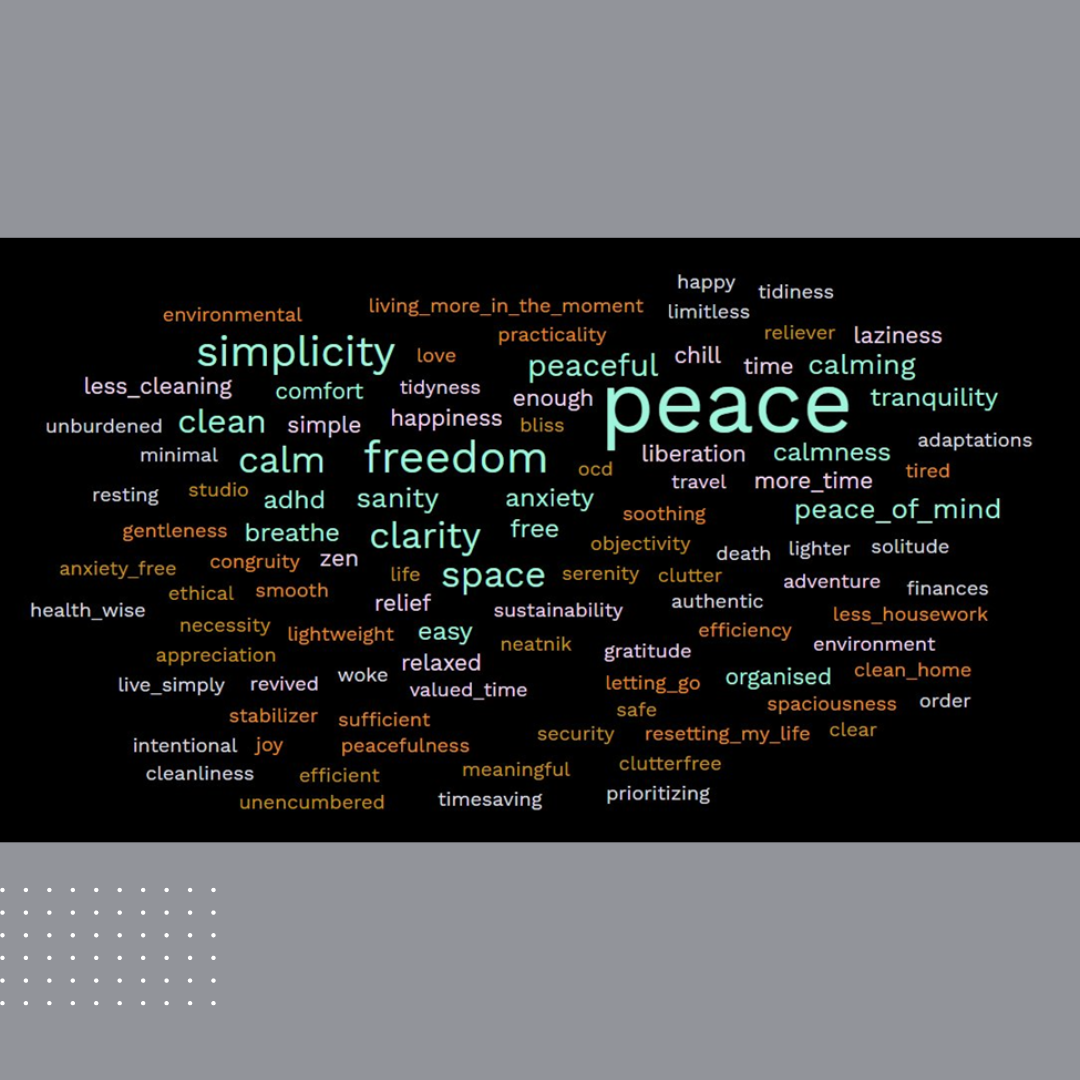Describe in One Word Why You Are a Minimalist
Blog Title: Describe in One Word Why You are a Minimalist
What’s the one word that defines your journey toward minimalism?
We live in a world where materialism is often glorified, yet many of us find solace in letting go. Writers, bloggers, and influencers often praise minimalism for the peace, clarity, and freedom it brings, but it’s still far from mainstream. In a recent online forum, minimalists shared words like serenity, sustainability, freedom, and sanity. Their 293 responses created a beautiful word cloud that hints at the vast emotional landscape of this lifestyle.
But what about the minimalists in the most expensive city in Canada? Do their stories resonate with these words? And what’s the one word that sums up their experience?
One Word: Why Minimalism?
For me, that word is stewardship.
According to Merriam-Webster, stewardship means the careful and responsible management of something entrusted to one’s care. For me, minimalism is about being a steward—not just of my belongings, but of the planet, our shared home. It’s the right thing to do, not just for ourselves, but for future generations.
Of course, words like peace, clarity, and freedom also resonate deeply with me. But recently, my sense of stewardship was put to the test when I had to clear out my mom’s 600-feet, one-bedroom apartment.
She had lived there for ten years, surrounded by simple comforts—just enough to meet her needs. But as I began packing her things, I noticed how much she had accumulated over time: pots and pans of every size, extra winter coats, more shoes than she ever wore. And then, there were the personal items: a basket of unfinished knitting projects, knick-knacks, sentimental gifts that had never been used, albums filled with memories now gathering dust.
Despite several rounds of downsizing over the years, it still took us over a week to clear out that small space. As we sifted through my mother’s belongings, each item holding memories or, perhaps, none at all, I realized that this was more than just a physical task. It was an emotional reckoning. And during those seven days, I learned four powerful lessons:
1) Things often outlive their purpose.
Many of the belongings had traveled with Mom from one home to another, yet they were rarely used. The mismatched dishes, old clothes, decorative trinkets—each had been carefully packed and carried, only to sit untouched. They occupied space but offered little value. Why did we hold on to these things? Nostalgia? Habit? A sense of responsibility? I wondered how often we keep things because of what they once meant, not for what they still offer.
2) Gifts don’t always serve the receiver.
Some of Mom’s possessions were gifts, still in their boxes, untouched and unused. It made me pause. How would the givers feel, knowing their thoughtful presents ended up in a donation pile or, worse, in the trash? Gifts are meant to be expressions of love or care, but I began to question how often our generosity becomes an unwanted burden. How many times have I given something in hopes of adding value to someone’s life, only for it to become clutter?
3) Excess takes time and space.
The extra coats, shoes, and kitchen utensils? They didn’t just clutter the apartment; they stole time—our most precious resource. Sorting through it all was exhausting. I couldn’t help but think about the hours we spent deciding what to keep, donate, or toss. Time that could have been spent sharing stories, reminiscing, or even grieving together. In the end, it wasn’t the items themselves that weighed us down; it was the time they demanded.
4) Waste and I.
Most of all, I was struck by the waste. What is our relationship with waste? So much of what Mom held on to ended up in the landfill. The donations? Just a temporary stop before their eventual disposal. It was a sobering reminder of the resources poured into creating these things—the pollution generated during production and the energy consumed in transportation. These items, now waste, had once been brand-new, eagerly purchased or received. But where was their value now? To whom did they serve or harm?
This experience made me think—if clearing out her apartment was so overwhelming, how would I ever manage my own five-bedroom home, overflowing with the belongings of my children, my grandchildren, and, yes, my own things?
Despite living a minimalist lifestyle, I’m still burdened by what remains. Even after four years of a strict personal "No-Buy" policy since the pandemic began in 2020, the accumulation persists. It’s as though the things cling to me as much as I once clung to them.
No Buy: Challenge
This brings me back to stewardship. Stewardship isn’t about perfection, nor is minimalism an endpoint—it’s a process. A lifelong commitment to living thoughtfully, questioning our consumption, prioritizing sustainability, and making space for what truly matters. It’s about asking ourselves, continuously: What serves me? What do I truly need? And, perhaps most importantly, how do my choices impact the world around us locally and globally?
I invite you to reflect on your own journey.
If you had to describe your minimalist path in one word, what word would it be?
What is the meaning of your word?



